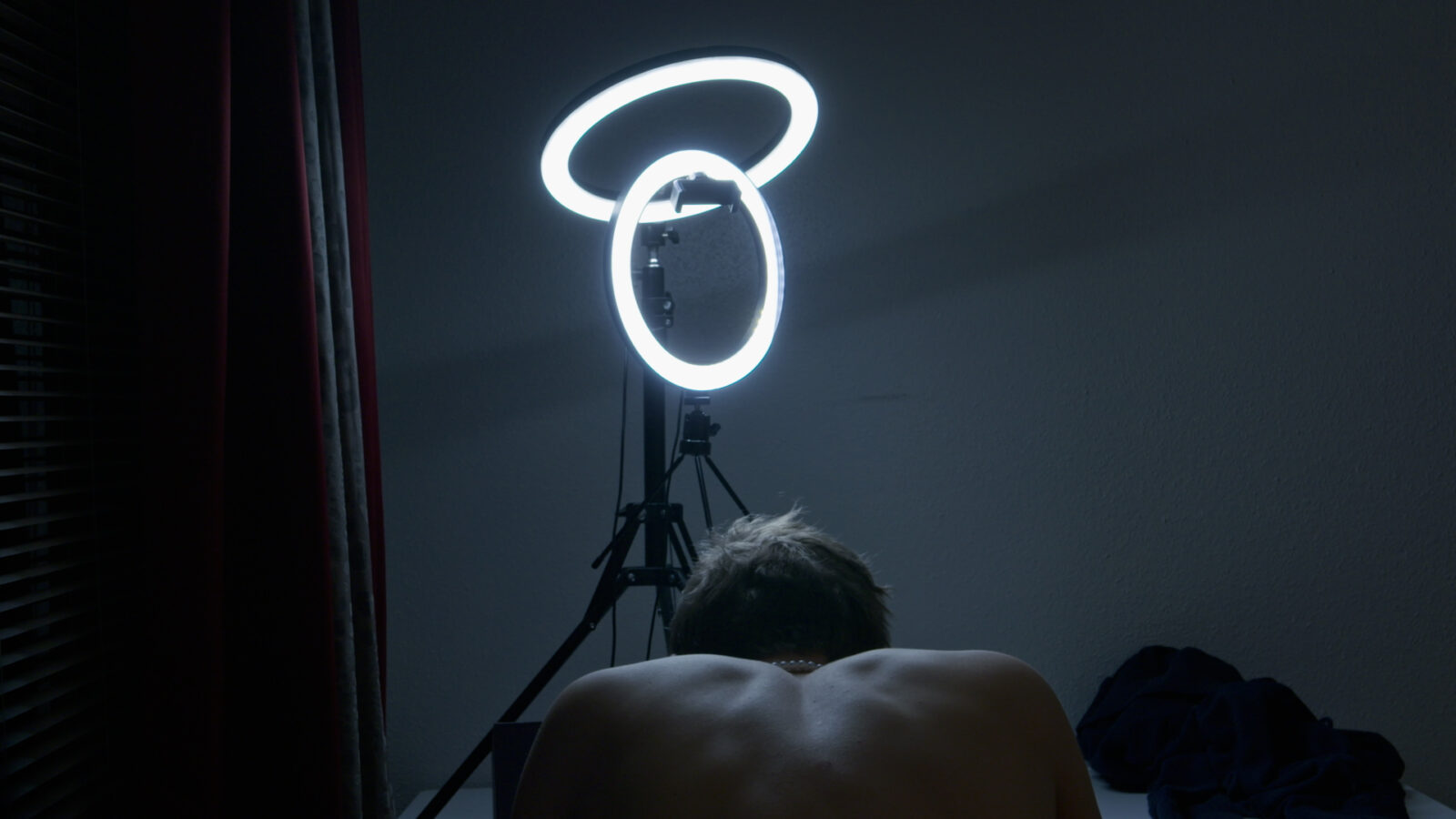Alphaland
Alpha Kings
Faye Tsakas and Enrique Pedráza-Botero’s incisive documentary incursion into the lives of teenage findoms is also a smart commentary on contemporary American society.

Four teenagers strike poses atop a playground slide. Their bare chests gleam in the autumn sunshine. A nostalgic visit to a childhood haunt? Not quite. Feet directed at the eye of a smartphone poised below is a giveaway. Welcome to the world of Alpha findoms—or financial dominators—who earn “tributes” or “tips” performing for clients who crave online humiliation. Hashtag sugarbaby; cashmaster; or humanatm to find them. Cue moral panic.
Alpha Kings is an incisive documentary incursion into the lives of teenage findoms. At first hand, the film dresses the portrait of a generation of self-reliant and emotionally ambiguous young men whose online personas are purpose-built for money making. Yet, it also expands into a smart commentary on contemporary American society.
From cosmetics to porn, the move to online life in the wake of the pandemic has created a fresh economy of influencers or “content creators.” At a time of unparalleled global wealth inequality, financial dominators show us that the guilt of the rich can be easily monetized. In this game of digital BDSM, money is the kink, and control over wallets, rather than bodies, is what is sought and bought. At least in theory: “Yeah, you can fucking cum,” decrees a nineteen-year-old blond while his friends laze on the couch scrolling through their feeds. Without an adult in sight, they look like some of Peter Pan’s lost boys, until you realise their low-budget productions turn a very, very high margin of profit—sums in the hundreds of thousands of dollars. Their business philosophy is neatly encapsulated during a livestream: “I want you to all go broke tonight.”
Since 2016, the British website Only Fans has made millions selling videos and photos by creators, with 20% taken on all online transactions. Live streams by male and female financial dominators are easy enough to find. But last year, the platform was rocked by several allegations of child pornography, with videos of children as young as five featured on the website. Calls for urgent regulation ensued. Creators were spooked at its potential consequences, but business seems to have since returned to normal.
Ring lights like fallen halos in a sparsely furnished bedroom. A male voice resonates with an eerie, metallic tone from the portal into the realm of finsubs that is the laptop. A fan asks to see his Alpha’s dental cavities. He is berated. Then, a tip comes in with a Vegas-like acoustic flourish. A spotlight promptly illuminates the insides of a boy’s mouth. He berates his client again—Larry Clark, eat your heart out. Another day, another pose: side by side, the boys display their sculpted torsos to the camera as they pass a joint around. It’s part performance art, part underwear shoot, part adolescent posturing. It is meant to be a catalogue of Alpha perfection, if by perfect you mean white male Abercrombie-models…. Only now is the culture of grooming and sexual abuse behind the flagship retail brand coming to light.
“Just like lowball the fuck out of it.” Advice from the only woman to figure in this financial fraternity. Carefully poised on the edge of a livestream, she keeps an eye on the cash as it pings its way in, working the calculator on her phone with manicured pink nails. Does she take a cut? Is she… their pimp? As with other aspects of sex work, the technological setup makes some concepts murky. “This is my boyfriend…. And I’m his manager,” she says with a smile. That’s that then.
Up close, the spotty faces of teenagers come into focus. Flickers of adolescent hesitation too, between empty junk food boxes and spouts of childish giggling. Then a synthetic assertion of manliness takes over, with its mandatory string of ‘fuck man’ and ‘dudes.’ Rarely has it been so clean that masculinity is a masquerade of sorts, both on and off camera. Yet the monetary logic that pervades these performances seems as simple as it is implacable: “I earn way more money doing this than anything else. I’m making money right now talking.” Casual, amateur, on-demand: this is pornography in the age of social media. But the barrier that is the screen also collapses in “meets” that place Betas only a foot away from their Alphas in pricey hotel suites. These real-life encounters, the film leaves out of view.
Quiet shots of the Houston suburb the boys inhabit are included instead: a residential compound of newbuilds that look like the leftovers of the 2008 financial crisis, the neon lights of a gas station, billboards for Republican governors, a putting session at the local golf course. Seemingly innocuous shots materialise the nexus of race, class, and sex that the online selves of these young Alpha Kings expand upon. Here is an America where the Boy Next Door makes a living online, humiliating strangers. Throughout, the crisp, matter-of-fact camerawork puts the realities of curated middle-class suburban life on the same plane as a uniquely transactional expression of teenagehood—an observational brand of filmmaking that leaves it to the excellent editing to provide subtle social commentary.
What emerges is a pervasive sense of disillusion. As they joke around in a jacuzzi, one of the boys says he doesn’t want to be broke and in college. Another laughingly relates his mother’s 8-12h shifts at a nuclear power plant, “And I still make more than her.” A touching childish vulnerability surfaces, but as these young findoms clamber out of the hot water, it’s as though the edges of the American Dream have been peeled right off. Unless it is given new life through a revised motto: Get Rich, or Dom Trying.





There are no comments yet, be the first!